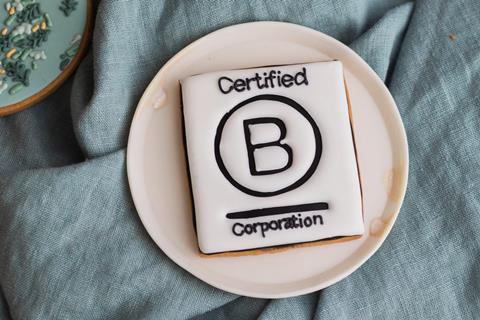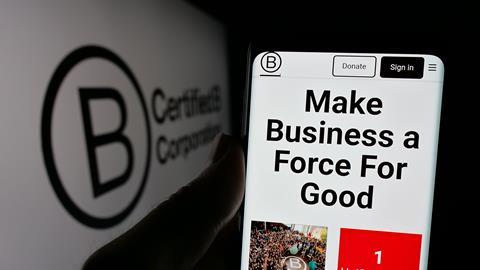B Lab’s update to standards outlines seven key areas for companies to address. Has it done enough to ward off ‘greenwashing’ accusations?
When you buy a Nespresso coffee, an Evian water or a Vivera plant-based burger, you should feel confident in supporting a business that’s a force for good. These brands all carry B Corp certification – a symbol of “high standards of social and environmental performance, transparency, and accountability”.
But the inclusion of these giants has raised questions over the credibility of the scheme – and the rigour and integrity of its accreditation process. After all, Nespresso is the subject of alleged human rights violations in its supply chains. And Evian’s owner Danone recently mounted a court case over French plastic laws.
To counter that criticism, B Lab, the organisation behind B Corp, released a new set of standards last week. The result of years of consultation, the revamp aims to regain credibility and “set a new bar for positive impact”.
The new standards certainly address some glaring holes in the old system. Most notably, it has done away with the cumulative points-based scoring system – seen as one of B Corp’s biggest weaknesses.
The system meant companies could pick and choose their categories of focus, to try and reach the necessary 80 points.
That also meant they could perform terribly on, say, human rights or climate change, so long as they did well elsewhere.
That approach is now gone. From next year, B Corps must meet minimum standards across seven key areas, made up of around a dozen individual requirements. Fail any of these and you will not be certified.
“This is the biggest evolution we’ve ever made,” says James Ghaffari, director of growth & product at B Lab UK. “We need to ensure companies are delivering a holistic impact across all these different areas.”

The seven new key standards
- Justice, equity, diversity & inclusion: Take action to create diverse and inclusive workplaces
- Government affairs & collective action: Act beyond own interest and have a broader systemic impact
- Environmental stewardship & circularity: Minimise negative environmental impacts in supply chains
- Climate action: Implement climate transition plans and contribute to the global goal of net zero emissions by 2050
- Human rights: Practice due diligence on human rights and remediate any negative human rights impact
- Fair work: Implement fair wage practices and improve workplace culture
- Purpose & stakeholder governance: Establish and advance purpose through the company strategy
Source: B Lab
Tough choices
Larger companies will face more extensive requirements. Big companies will need to calculate their gender pay gap, for example, while the largest will need to publicly publish it.
Overall, the change is intended to trigger challenging questions inside both large and small companies. The standards require them to look more closely at embedding good oversight, governance, and practice in their day-to-day operations.
While those processes may already be well established for some, for others, it could mean tough choices.
“Large companies may find it tricky to meet the government affairs requirements, for example,” suggests Adam Garfunkel, co-owner of B Corp consultants Junxion Strategy and a member of B Corp’s regional standards advisory group for the UK.
“Because these essentially mean you can’t be saying, on the one hand, ‘we’re a good B Corp’, and on the other, lobbying with your trade body to slow down progressive regulations.”
However, dig deeper into the standards and some wriggle room emerges. On human rights, for example, B Corp’s new standards state all medium-sized companies must have both a human rights policy and a strategy to tackle the most pressing issues.
The issue? If violations emerge, B Lab makes no mention of withdrawing the certification. Instead, a company would be required to record the lessons learned, what it plans to do differently, and how it has updated its strategy as a result.
The same goes on climate change. All large companies must now document, verify, and publicly share their greenhouse gas emissions, alongside publishing a climate transition plan on how they will hit net zero by 2050. But again, when they fall short, they must only record the lessons learnt.

Understandably, B Lab does not want to punish good companies trying their best and falling short. But the question is whether it is tough enough on ill-intentioned companies using the scheme to help greenwash their reputation.
“I don’t think the new standards step forward in terms of rigour and holding businesses to account,” argues Aneisha Soobroyen, CEO of petfood company Scrumbles, which ditched B Corp in February after concluding it had become “a marketing badge rather than a true mark of an ethical business”.
If accountability only extends to “lessons learned”, B Corp is not fulfilling its pledge of enforcing high ethical standards, she says. “Without clearer consequences or minimum standards that must be met, it does create space for greenwashing.”
The issue of uniform enforcement of standards is recognised as a ‘known unknown’ within B Lab, and one it is working to fix. It comes down to efforts to address a long-perceived weakness: third-party verification. B Lab has so far checked all applications itself.
From next year, when the standards launch, B Lab will put in place an external organisation that is solely responsible for verifying all applications. The change will apply worldwide, but it was triggered by new EU regulations that came into effect last year. They require a company making a sustainability claim to have it assured by a third party.
Read more:
-
Long-awaited B Corp refresh revealed with seven key standards
-
St Ewe becomes first UK-founded egg packer to achieve B Corp status
-
Lomond becomes first Scottish wholesaler to achieve B Corp status
-
Becoming a B Corp helped us drive change and excited our team
The details of how exactly the process will work are still unknown, as are the new costs for companies. This is because B Lab is leaving it to the assurance provider to determine the threshold and repercussions for failing to meet the standards.
B Lab hopes this division of rule setter and rule enforcer can create a healthy system of checks and balances – and address any criticism that the scheme is too lax on miscreants.
B Corp companies are only just starting to digest the detail of the new standards, but many are welcoming the more taxing requirements. “This is the right thing for them to be doing,” says Jon Walsh, co-founder of B Corp-certified Bio&Me.
“It is more rigorous. It will be more challenging. And that’s the whole point – get people in and then float everybody up by raising the standards.”
There will be time before this happens. The standards will only come into effect next year – meaning companies who have recently certified won’t need to go through the process for another few years. It will likely be at least 2028 before the entire B Corp community is certified against the new standards.
A lot is riding on it. While B Lab says it welcomes the “healthy tension” between members’ views, a scheme such as B Corp is only as strong as its external perception.
Until now, it has had huge success in establishing itself as a major scheme with thousands of members. But as it continues to grow, it must now prove it can match size with quality.




















1 Readers' comment